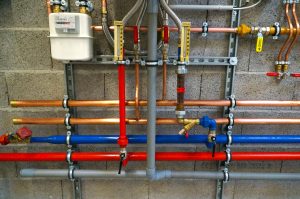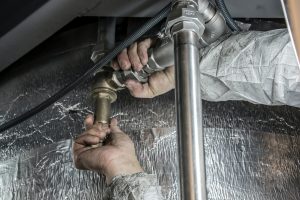If you’ve ever had a leaky pipe that you couldn’t fix, you may have been surprised to see how fast a qualified plumber took to sort the problem. Plumbing is something that can look so easy, however, it requires expertise.
Plumbers install, repair, and maintain plumbing fixtures in homes and businesses. While the plumbing career is very popular, one of the most common questions people who are curious about the profession ask is: how much does a plumber make? Knowing how much a plumber earns can help you plan your career and avoid getting short-changed.
Before we dive into the salary range for plumbers, let’s discuss some of the responsibilities of plumbers.
The plumbing career is quite versatile. As a plumber, you will be required to install, maintain and repair all plumbing fixtures including water and gas supply lines, sanitation units, appliances, heating systems, and other associated fixtures. This can either be in the industrial, commercial, and residential settings. Plumbers also inspect plumbing systems, design, perform diagnostics and ensure compliance with regulatory codes. They also handle customer queries and prepare cost estimates.
So, how much does a plumber make?
How much a plumber makes depends on various factors, including qualifications and work experience. The area a plumber specializes in also makes a difference. Specializing in more difficult and dangerous plumbing fields can fetch you a higher salary than a plumber who specializes in basic plumbing duties.
What about employers? Different employers have varying salary ranges. Working for large corporations may earn you more than what you would make working for a start-up company.
How much do plumbers make a year? According to the U.S Bureau of Statistics, the median pay for plumbers is $56,330 per year and $27.08 per hour as of May 2020. The highest 10% earned over $98,990, while the lowest 10% earned $33,460. The salary range varies across industries. For instance, the average pay for plumbers in manufacturing was $58,580 per year (as of May 2020), while those who worked in government made $58,260 per year. Plumbers who worked for heating, plumbing, and air conditioning sectors earned $56,840 while those in the heavy and civil engineering construction sectors earned $56,840.
If you are just starting your plumbing career, one of the questions that you may have is: how much does an apprentice plumber make? An apprenticeship is the best way to jumpstart your plumbing career. It allows you to earn money while also getting the necessary knowledge and skills.
Apprentices earn approximately half of what fully trained plumbers get. However, given the experience that apprentices receive, one should not be too focused on the salary. Rather, they should be focused on getting the necessary experience and upskilling.
Why are apprentices paid less than qualified plumbers?
An apprenticeship provides a learning opportunity for entry-level plumbers. Given the lack of experience, an employer invests a lot of time and resources in the training. This training should help an apprentice get a plumbing education and advance their skills in the trade.
Once an apprentice masters the skills of the trade, they can advance to become a journeyman. A journeyman plumber is a plumber who is fully skilled and can work in residential and commercial settings. Journeyman plumbers are regarded as experts in all plumbing fixtures such as gas lines and drainage systems. They can also supervise apprentice plumbers.
How much does a journeyman plumber make? Since they are fully skilled plumbers, journeyman plumbers earn the average plumber salary based on the industry and line of work. Master plumbers, however, have the highest earning potential, with some earning close to $100,000 per year. While a plumber and master plumber may have similar work proficiency, the latter has more certification and licensing. Also, a master plumber has more experience in business management while journeyman plumbers focus on the plumbing aspects of their work.
What is the fastest way to start earning as a plumber?
The financial aspect of any career cannot be ignored. For some, earning while studying may not be preferred. For others, however, earning while learning on the job is the only option to getting some income.
Luckily, if you want to become a plumber, a pre-apprenticeship associate’s degree program is a great way to start your career. This is offered in community or technical colleges. The training will provide vital knowledge and skills that will help you work under a licensed plumber.
Once you complete the pre-apprenticeship program, you will be required to complete an apprentice program, which can last 4 to 5 years. As we mentioned, you will receive classroom instruction for the said period while still earning on the job. Once completed, you can become a journeyman plumber.
Must you be licensed to work independently as a plumber?
How will becoming a licensed plumber benefit you? If you are doubting the importance of getting a plumbing license, you need to check out statistics that answer the question, ‘how much does a licensed plumber make?’
You may be surprised to know that you can get double what you earn as an apprentice by getting the required licensing. While this varies in most communities and states, you will be required to get 2 to 5 years of plumbing experience. Also, passing a general plumbing trade examination will be required. Different states have varying plumber licenses. With additional training and experience, you can become a master plumber.
Summary
A plumbing career offers great remuneration. An apprenticeship is a great way to start your plumbing career. Although apprentices earn approximately half of what qualified plumbers get, they get to advance their plumbing skills while still earning. However, extra certification and licensing will earn you an even higher salary.




